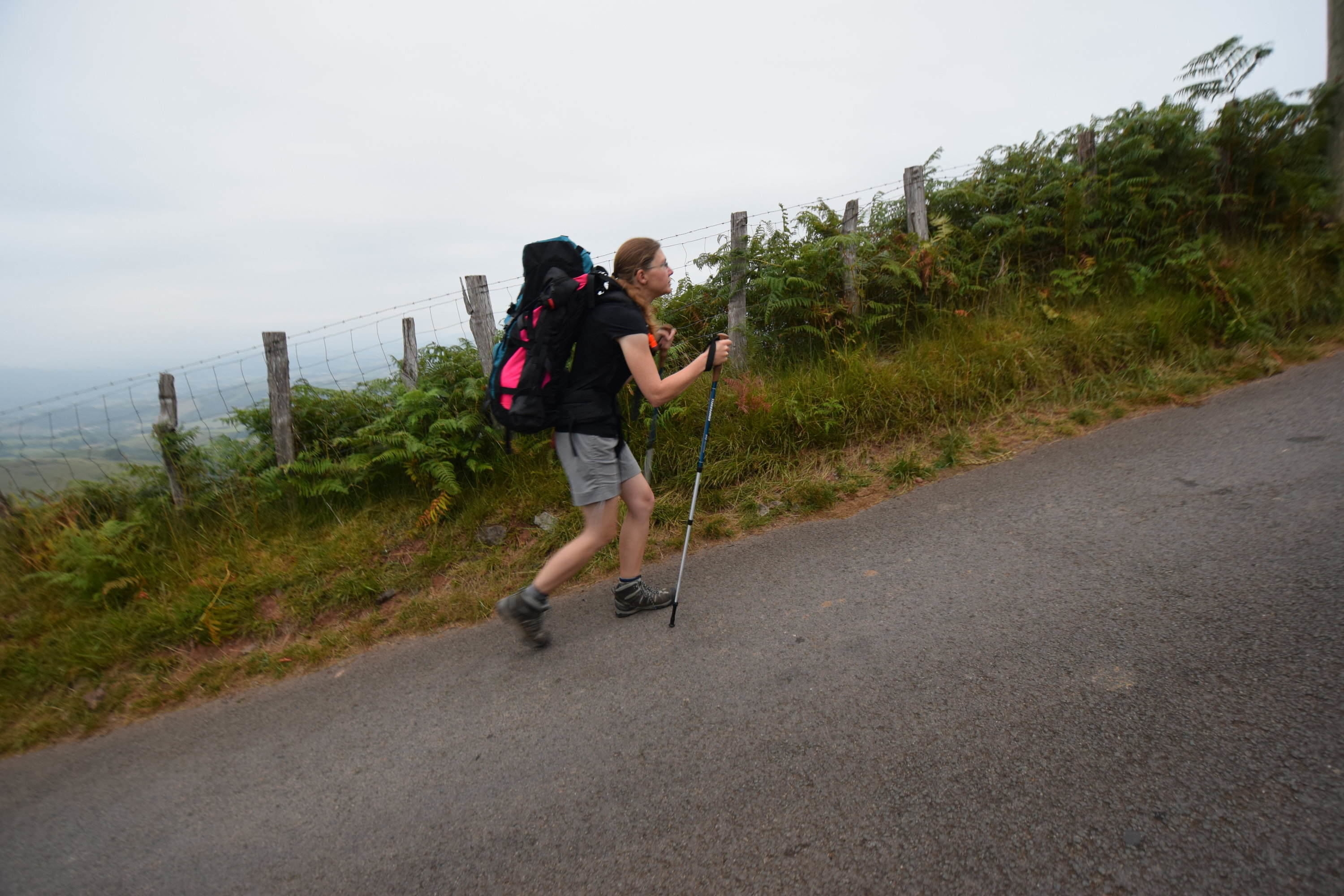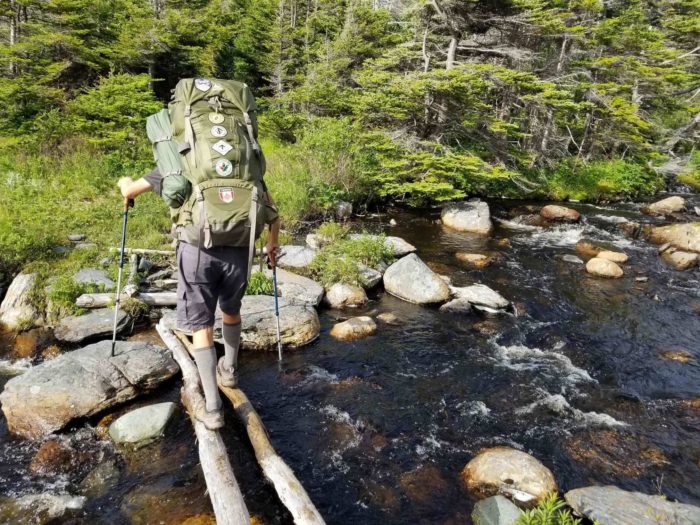Are You a Real Hiker? Are You an Authentic Pilgrim?
Are you a Real Hiker? Some version of these questions has been raised before, during, or after every longer hike we've done. Sometimes it takes the form of jokes told strolling down the trail, or as a friendly, philosophical discussion around a campfire or the dinner table in an albergue. Other times it morphs into a heated debate. If you've found the courage to attempt anything life-changing or different, chances are you've encountered at least one detractor along the way. Sometimes criticism comes from people who simply cannot imagine the value of questioning routine or stepping outside their comfort zone. Other times it comes from those who seem threatened by the accomplishments of others, as if their own experiences are somehow diminished if they are shared. Sometimes haters just hate.
Recently we published a blog entry on hiking for a cause during our trek across Canada, the result of which has been an extraordinarily large number of emails, facebook postings, and messages stating that we are being disingenuous and that it is ‘heartbreaking’ because hiking for a cause takes away all of the ‘true essentials’ of being a ‘real hiker’. Which naturally led us to ask the question – what is a real hiker anyways?
Since we're hoping to inspire people to embark on new adventures of their own, I think it is worth sharing some of our favorite jabs and arbitrary standards sent to us detailing what 'a real hiker' or 'a real trail' is.
You're not a real hiker because ....
 That trail is too easy, it doesn't go through wilderness, and you sleep inside every or some night.
That trail is too easy, it doesn't go through wilderness, and you sleep inside every or some night.You didn't carry everything you need on your back.
Your hike didn't require you to wear hiking boots.
You're hiking for a cause, not for yourself or the experience.
You’re trekking with a camera and not living in the moment.
You’re section hiking rather than thru hiking.
You're blogging or vlogging your hike, so you're missing the 'real' experience.
If you’re trekking for personal or social reasons rather than to enjoy wilderness.
Are you not here for religious or spiritual reasons and so you are a touristimo not a Pelegrino.
You're hike doesn't count because ....

You took a break partway through the trail.
You didn't walk every square inch of the trail (even if part of it was closed)
Your trail is not long enough.
You're skipping the hardest part.
You’re not trekking during the hard weather.
Your trail goes into a town.
Your trail follows a roadway for a period.
Your trail lets you hike on sidewalks.
Your trail follows a cut pathway rather than bushwhacking
If anyone can do it, it is not a real trail and your hike does not count.
Spoiler alert: This post does not provide a definitive answer the questions 'Are you a real hiker?' or an ‘authentic pilgrim?’ In my opinion, only you can answer that question. If you don't meet the criteria of an official thru-hike, then don't claim you're an official thru-hiker for that trail. If you're not an official thru-hiker, it doesn't mean you're not a real hiker. Any criteria you use to define a 'real hiker' are subjective, and nobody's opinion matters except your own. What follows is my opinion, so feel free to stop reading.
Still there? Then read on and enjoy.
Our Response
We all walk our own path. We're all looking for something along the way, even if we don't know what it is. If you set out on a hike to find your answer, or even your question, and you do your personal best, then in my opinion you are a real hiker. Whether you have the most expensive pack on, trek in a city, down a sidewalk, and go 2km, 200 km, or 2000km. For some people, it might be important to walk every inch of trail. For others, surviving the wilderness might provide what is needed. Perhaps the necessary challenge is to overcome fear, loneliness, or hardship. Alternatively, it could be to develop a deep relationship with other people. Maybe the lesson is to let go of control, to gain independence, or to find inner peace. There are as many ways to find these answers as there are people. If you test your own limits, challenge yourself, and make an honest effort to find what you're looking for, in my books you're a real hiker. People have different abilities and different expectations, and I would venture to suggest that many of the critiques placed on them are the results of others demands and judgments - and to me that is not what trekking is about. If you get out there and do what you need to do, achieve what you set out to achieve then you are a hiker – at that point everything else is just critiques from arm chair warriors and should be taken with a grain of salt. If you 'cheat', at the end of the day, you will know, and only you will lose. If you're a real hiker, you will know it. At the end of the day – or the hike – the voyage isn’t about a certificate, credential, patch on the bag, or the selfie at the end of the trail – it is about seeing yourself and the world from a different perspective. As Dana Meise, the trailblazer of The Trans Canada Trail / Great Trail recently commented ‘it is not the number of kilometres you hike but the quality of the steps taken.’ No one can take away the friendships, memories, experiences or wisdom you gain on the trail.
The Challenge
It can be very difficult not to judge others, especially when we think they are 'cheating.' One of the hardest things for me was reaching Sarria, Spain after walking 700 km along the Camino de Santiago. At this point the Camino becomes flooded with 'new' pilgrims, because it is 100 km from Santiago de Compostela, and this represents the minimum distance that must be walked to receive a Compostela certificate. Many of the 'new' pilgrims had their luggage transported and had bus support if they got tired. At first, it seemed to me they were missing the point. It took an effort for me to realize that I don't know those people, and I have no right to judge them or their experiences. Maybe that 100 km represented a challenge to their comfort zones, physical abilities, time-frames, or financial circumstances. They were out there, giving it a try, doing it for their own reasons, pushing their own limitations, and finding what they needed to find. In retrospect I am ashamed of how I felt towards many pilgrims joining the trail in Sarria. My reactions, at the time, show that I still had (and perhaps still have) further to walk to understand the trail and the world from other people's situations and perspectives.
Since my hike alone the Camino Frances, I've read and watched the documentary 'I'll Push You', which tells the story of Justin Skeesuk and Patrick Gray. Justin Skeesuk didn't walk a single step of the Camino, and yet his 800 km journey along it is one of the most inspiring, humbling, and profound stories I've ever witnessed. If you find yourself judging others, ask yourself why their achievements are so important to you. If you find yourself being judged, look at your own experiences, and don't let anyone else try to dismiss or diminish them.
Sometimes criticism is well founded and should be considered. Other times haters just hate. Our next post will describe how these comments have changed our approach and preparations for our upcoming hike.
As as you head out on the AT, the PCT, the CDT, or any of the wonderful trails around the world this season remember we are pulling for you and want you to succeed!
See you on the trail!
Remember to follow our entire adventure here : www.comewalkwithus.online

Comments
Post a Comment